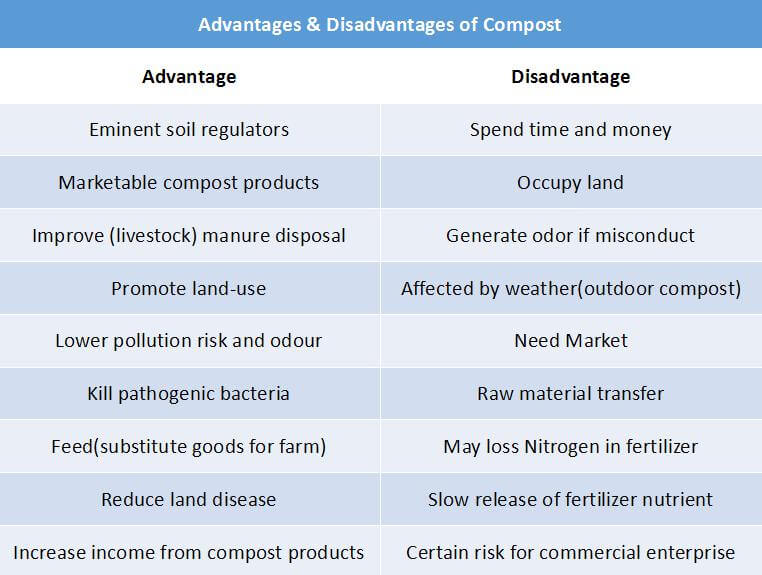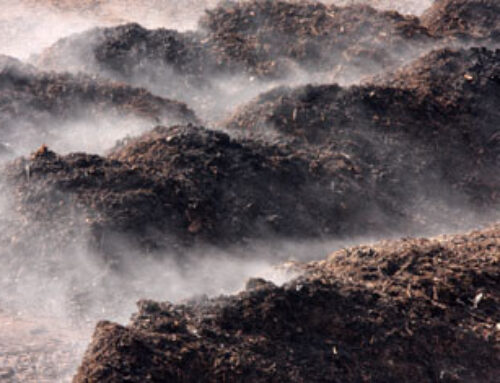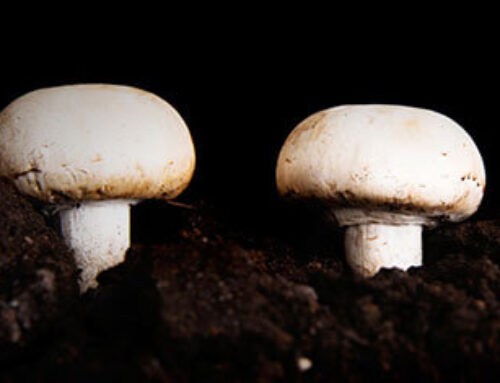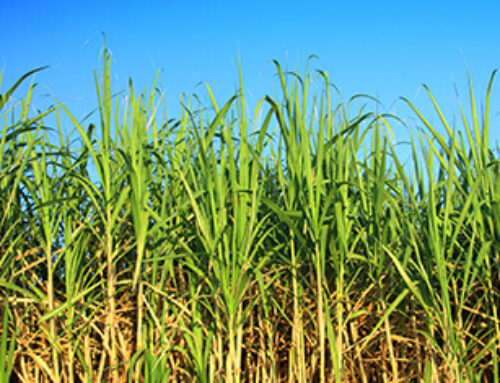
From the major terms, compost has two main advantages: first, it can transfer the waste into materials easy to dispose of; second, compost can create valued goods – composting products, like organic fertilizers. But the disadvantage is that composting always needs time and often faces some risks because people cannot put manure beside or behind livestock sheds if they plan to get finished composting products after several weeks. As the old saying goes, any successful project needs a certain time and experience to accumulate, and so does compost.
Advantages of Compost
The major merits of compost contain soil reclamation, producing marketable products, improving the disposal of agricultural waste, kitchen garbage and livestock manure, enhancing land utilization, lowering pollution risk, eliminating pathogenic bacteria, and using compost as a feed substitute, preventing disease, and increasing income, etc.
- ◆ Soil improvement: composting belongs a quite good amendment for soil texture, and when used for cropland, it can increase organic matter, improve soil structure, reduce fertilizer dosage, and relieve potential erosion of soil.
- ◆ Marketable products: one of the most attractive characteristics is that composting products have their markets, and potential consumers including courtyard planting, gardens, vegetable growers, lawn planting, and even golf course operators, etc. Due to being viewed as a wasting product, the price of compost varies greatly, mainly depending on its market demand, composting quality, raw material cost, and so on.
- ◆ Livestock manure disposal improvement: composting can reduce manure weight, water content, and activity, making manure easy to deal with and store well without the condition of odor and mosquitoes and flies. In virtue of its storage property, compost can be used at any time of the year to reduce the loss of Nitrogen in cropland. Although manure volume decreases greatly after composting, whole compost volume changes a little because of adding conditioner(photosynthetic bacteria or other bacteria).
- ◆ Land utilization melioration: both composting and (livestock) manure have fertilizer value and commendable soil conditioner. Although spreading manure directly on farmland also can give play to soil quality improvement, it is not advisable to do so because a fermented mixture will cause plants to die. Fortunately, after composting, the merits of manure appear obviously as follows:
▽ Composting can make Nitrogen of manure become more stable organic nitrogen, in spite of some part loss, the best part is not easy to get wet and volatilize.
▽ A high percentage of clinker manure has a high carbon-nitrogen ratio. When applied to the soil directly, carbon in manure would prevent nitrogen absorbed by plants; on the contrary, after fermentation and compost, it can lower C/N and be more suitable for soil use.
▽ The heat produced during the composting process can reduce the number of harmful germs and weed seeds. - ◆ Lowering pollution risk and foul smell complaints: with the scale-up development of agriculture especially the livestock industry, poultry manure has become a kind of encumbrance instead of wealth. For those enterprises without large areas of land to absorb this manure, an animal quantity far exceeds the bearing capacity of the land, and how to deal with manure becomes a headache problem. Additionally, too many animals cause bad smell issues, bringing lots of conveniences and adding contradiction to nearby residents. But luckily, composting can alleviate the effect of these problems, and people do not need to worry about its outlet due to composting products are always in demand. Besides, its storable feature also allows being transported to farther places than manures. The well-working manure compost equipment, like compost windrow turner, basically won’t produce any stench and mosquitoes and flies. Composting also can change Nitrogen into some type uneasy to permeate or flow away.
◆ Killing pathogenic bacteria: in the waste, there were almost no human pathogenic bacteria, but afterward, giardia and cryptosporidium parvum broke out among livestock. These protozoans can cause people and animals diarrhea over and over again, while for those animals with bad immune systems, the situation is worse. Protozoan always hides in the excreta of infected animals, able to survive even in an adverse environment. The manure of infected animals (home breed or wildness) may pollute feed or source of water, which would make other livestock infect these parasites. Generally, these protozoan bacteria can be killed once they are exposed for thirty minutes under the condition of 60 degrees Celsius. And the temperature of composting process can reach 60 degrees Celsius, but the part near the surface of composting may not reach this temperature, then pile-turning with a self-propelled compost turner can make all raw materials reach the required temperature.
- ◆ Feed substitution: fully ripened compost can be used for livestock and poultry fodder, and research and tests show that compost is basically safe and efficient fodder.
- ◆ Disease prevention: compost after complete fermentation can lighten soil properties and disease of plants without using chemicals to control it. Nowadays, the feature of preventing the disease from compost has been widely used and recognized. Extension Reading:
1. Parameters Affecting the Composting Process and Generated Compost Quality
2. Active Influences of Composted Municipal Solid Waste on Soil and Agriculture



 ◆ Killing pathogenic bacteria: in the waste, there were almost no human pathogenic bacteria, but afterward, giardia and cryptosporidium parvum broke out among livestock. These protozoans can cause people and animals diarrhea over and over again, while for those animals with bad immune systems, the situation is worse. Protozoan always hides in the excreta of infected animals, able to survive even in an adverse environment. The manure of infected animals (home breed or wildness) may pollute feed or source of water, which would make other livestock infect these parasites. Generally, these protozoan bacteria can be killed once they are exposed for thirty minutes under the condition of 60 degrees Celsius. And the temperature of composting process can reach 60 degrees Celsius, but the part near the surface of composting may not reach this temperature, then pile-turning with a
◆ Killing pathogenic bacteria: in the waste, there were almost no human pathogenic bacteria, but afterward, giardia and cryptosporidium parvum broke out among livestock. These protozoans can cause people and animals diarrhea over and over again, while for those animals with bad immune systems, the situation is worse. Protozoan always hides in the excreta of infected animals, able to survive even in an adverse environment. The manure of infected animals (home breed or wildness) may pollute feed or source of water, which would make other livestock infect these parasites. Generally, these protozoan bacteria can be killed once they are exposed for thirty minutes under the condition of 60 degrees Celsius. And the temperature of composting process can reach 60 degrees Celsius, but the part near the surface of composting may not reach this temperature, then pile-turning with a 


